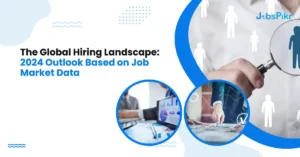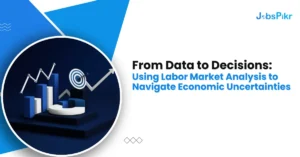Recruiting today looks radically different than it did just a year ago. Accelerated by COVID-19 and the movement for racial justice, changes that were expected to take years are happening instead in months. Virtually recruiting remote workers is the new norm for many. Internal mobility and upskilling programs are being built out, many for the first time. Diversity is finally being treated with the urgency and accountability it always deserved. To help you manage these changes and get ahead of what’s coming next, we’re making six bold predictions about the future of recruiting. These global recruiting trends distil what we learned from data extraction from techniques from multiple platforms.
Foresight #1: Recruiting will hire less, build and borrow more
Foresight #2: Recruiting will help keep the business accountable for diversity
Foresight #3: Virtual recruiting is here to stay
Foresight #4: Recruiters will lead the transition to remote work
Foresight #5: Recruiters will build new skills to align with the business
While this data lays out the big picture, we’ll continue to share more detailed data insights, learnings from leading companies, and actionable tactics to help your team take on the future of recruiting.
Prediction #1: Recruiting will hire less, build and borrow more
No longer nice-to-have, internal mobility will be a must-have. Partnering with learning and development (L&D) and broader HR, recruiting will have the opportunity to lead/build a rigorous internal mobility program rather than leaving it to hiring managers or ad hoc practices. Companies will aim to catalogue employees’ current skills and tie internal job opportunities to relevant L&D resources that will help employees fill any qualification gaps.
Facing unprecedented uncertainty and volatility, companies will also move away from static jobs in siloed departments and toward project-based cross-functional work, where employees will shift to new projects as business needs change. (Recruiters themselves experienced such a change in the immediate response to COVID-19, with many moving to new projects when hiring slowed.) The global recruiting trends have transformed rapidly over these years.
This will also change the way recruiters assess and hire talent. For example, they’ll prioritize applicants’ potential and transferable skills, like adaptability and problem-solving, over their pedigree and technical capacity to do specific tasks.
Prediction #2: Recruiting will help keep the business accountable for diversity
Since companies worldwide pledged their support for Black Lives Matter and greater diversity, candidates, employees, and consumers have been looking to see how those words will translate into action. Diversity is not a feel-good “initiative,” but a business-critical imperative — one that recruiting can lead. The global recruiting trends have transformed rapidly over these years.
Remote work will vastly expand available talent pools, allowing for greater access to candidates from underrepresented groups and deflating empty excuses that the talent isn’t there to be found.
Recruiters will not only deliver a diverse pipeline of candidates but advocate for them and hold hiring managers accountable for moving those candidates through the funnel. In addition, they will restructure hiring processes to reduce bias, from building diverse interview panels to mandating data-driven reporting against diversity goals.
Prediction #3: Virtual recruiting is here to stay
Companies have dabbled with video interviewing and remote assessments in the past, but the lockdown realities of COVID-19 have sparked them to create an end-to-end virtual recruiting process for the first time. And they’re both noting and embracing the cost and time savings that that change has brought with it. So, in the same way, a hybrid workforce of onsite and remote employees will become the standard, a hybrid hiring process that combines virtual and in-person elements will become the norm.
The challenges for companies will be twofold. First, businesses will need to refine their virtual processes and, as they nail the technology, make sure they continue to look for ways to add human touches back into their systems. Second, they will have to decide when they’ll use virtual and when they’ll use in-person, how will they optimize the candidate experience and assessments advantages of in-person yet continue to leverage the speed and efficiency of virtual.
Candidates for entry-level positions may experience a completely virtual hiring process, not setting foot in the office until they’re onboarded, if then. On the other hand, executive candidates will continue to receive a more bespoke process with numerous onsite visits and face-to-face one-on-ones.
Prediction #4: Recruiters will lead the transition to remote work
Recruiters have traditionally been strong advisors to the business when it comes to workforce planning; now, they have the opportunity to become indispensable. Remote work tantalizes with its promises of diverse talent pools, increased productivity and retention, and savings on salaries and facilities, not to mention a smaller carbon footprint.
But it also complicates workforce planning with difficult considerations around compensation (what will fair pay look like with a distributed workforce?), capacity planning, company culture, technology, and employee visibility.
Recruiters are uniquely positioned to provide essential insights on this transition, coming to the table armed with data-driven insights about where talent is and anecdotal feedback about what talent wants and needs. Knowing those concerns can give companies a competitive advantage – when they move quickly to address them. The global recruiting trends have transformed rapidly over these years.
Recruiters can also help the business weigh the benefits of an anywhere-in-the-world approach versus a hub strategy of targeting a few sites that will make career development and cultural adhesion more robust.
Prediction #5: Recruiters will build new skills to align with the business
Recruiting teams have been stretched and wrenched and refashioned in recent months, and that’s likely to continue. From dealing with hiring slowdowns (or, in some industries, unprecedented spikes) to align with ever-shifting business priorities, the one constant for recruiters will be the need for adaptability.
While some recruiters will hire for different roles, locations, or teams as needs change, many others will be asked to go beyond hiring. The fastest-growing skill for recruiters is personal development — the ability to add new skills.
Advanced hiring platforms and recruitment agencies will increasingly serve as the bridge between a company’s hiring needs and other key HR initiatives. They’re no surprise then that they’re rapidly adding skills like diversity and inclusion, decision-making, and HR strategy to their tool belts and resumes. In addition, they will bring clarity to talent data, reshape employer branding, and fine-tune the virtual hiring process — all in a continuous process of improvement.




